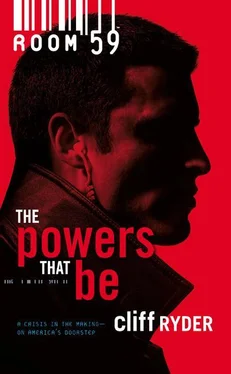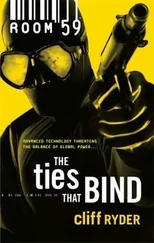Cliff Ryder - The Powers That Be
Здесь есть возможность читать онлайн «Cliff Ryder - The Powers That Be» — ознакомительный отрывок электронной книги совершенно бесплатно, а после прочтения отрывка купить полную версию. В некоторых случаях можно слушать аудио, скачать через торрент в формате fb2 и присутствует краткое содержание. Жанр: Триллер, Шпионский детектив, на английском языке. Описание произведения, (предисловие) а так же отзывы посетителей доступны на портале библиотеки ЛибКат.
- Название:The Powers That Be
- Автор:
- Жанр:
- Год:неизвестен
- ISBN:нет данных
- Рейтинг книги:3 / 5. Голосов: 1
-
Избранное:Добавить в избранное
- Отзывы:
-
Ваша оценка:
- 60
- 1
- 2
- 3
- 4
- 5
The Powers That Be: краткое содержание, описание и аннотация
Предлагаем к чтению аннотацию, описание, краткое содержание или предисловие (зависит от того, что написал сам автор книги «The Powers That Be»). Если вы не нашли необходимую информацию о книге — напишите в комментариях, мы постараемся отыскать её.
The Powers That Be — читать онлайн ознакомительный отрывок
Ниже представлен текст книги, разбитый по страницам. Система сохранения места последней прочитанной страницы, позволяет с удобством читать онлайн бесплатно книгу «The Powers That Be», без необходимости каждый раз заново искать на чём Вы остановились. Поставьте закладку, и сможете в любой момент перейти на страницу, на которой закончили чтение.
Интервал:
Закладка:
Although Damason did learn much about how to run a profitable business, what was even more valuable to him was the time spent with the people in other countries. He was stunned to discover the many personal freedoms that people enjoyed in places like Spain and Sweden. The cultures, opinions and philosophies that he was exposed to only served to illustrate the wide gulf between the Cuban people and the rest of the world. When he had naively tried to explain that Cuba was the greatest nation in the Western Hemisphere, he was astonished at how quickly others dismantled his arguments. Most piercing was a piece of advice from a Spanish professor who said, “When you return home, try to look at it not from the viewpoint of a Communist, or even a Cuban, but simply as a human being, and ask yourself, ‘Is this how human beings should live?’A leader truly dedicated to his people would put them first, not his cause or ideology.”
When he had returned to his homeland, he had taken a good look around and saw, as if for the first time, the crushing poverty, the unemployment or menial jobs available to many people, the high education level yet the scarcity of appropriate jobs for white-collar workers and, increasing more and more every day, the tourist apartheid, as it was referred to by many outside the nation, where resorts, beaches and other areas were available only to foreign travelers and off-limits to Cuba’s own people. The law was even enforced by the police officers, putting the foreign dollars before their own countrymen.
When Castro eliminated the reform programs his brother had instituted, he announced that those changes were coun-terrevolutionary. There was an increase in crime and corruption, but no change in the everyday life of the average Cuban citizen, who still existed on only a few dollars a day.
When he heard that message broadcast to the people, Damason had realized an inescapable fact—Castro and the state-controlled media said one thing, but the neighborhoods and people of Cuba showed the exact opposite. He had gone out and seen the truth with his own eyes.
And if Castro was wrong, then what did that make him?
What did that make a man who had spent his entire life following the orders of a leader he’d respected and trusted, a leader who had ordered him to spread fear, to punish the innocent, to brutally oppress those who were simply trying to improve their lives and the lives of those around them?
A lesser man would have broken under the weight of having his world so completely shattered. Growing up in the streets, Damason had learned to rely on himself, and only himself, to survive, and when this reality was forced upon him, he turned from Castro, turned from Communism and turned inward to survive. Outwardly, he was the same person that everyone else knew—a dedicated soldier, a loving father, a staunch Communist. On the inside, however, he was a seething storm of rage at what was being done to his country, to his fellow citizens, all in the name of a failed ideology that should have died out with its creators in the previous century.
It happened one night at home, when Damason was playing with his two young daughters. As he watched them chase each other around their bare, crumbling, three-room apartment, he had realized a second vital truth. He did not want his daughters growing up in the same environment that he had. He wanted them to have the freedom to choose what to do with their lives, not have things forced upon them. He did not want to see his daughters, the twin joys of his life, turned into subservient Communist lackeys, working all their lives for someone else’s outmoded ideal of a disintegrating social model.
Damason decided that night that something had to be done. The only question was, what? The entire island was riddled with informers and secret police. A wrong word to the wrong person could land him in prison next to the very men he had persecuted for years. It was nearly impossible to figure out who might be willing to gamble everything on a desperate bid for freedom and everything—good and bad—
that might bring.
There was a bigger problem that affected his decision—
his family. Damason had fallen in love when he was a corporal, and married a wonderful woman who had borne him two lovely children. The path he was considering would put them in terrible danger and could very well mean their deaths. It was just another aspect of what he wrestled with every day, trying to reconcile what he could do for his country with the realities of the situation.
There had already been some attempts to initiate change—of that he was sure. While in Spain, he had been approached by a university student who had put him in touch with a small division of the State Department of the U.S. government, requesting information about Cuba’s government and its military. At the time, he had rebuffed the man and even let the people at the university know what had happened. But he hadn’t told any of his fellow officers, nor had he let his superiors know about the incident upon his return home.
When he had come to his realization, he managed to contact that same student, who put him in touch with an American contact. He had fed information to that contact for over a year. He would drop the most recent data he had, and would receive confirmation that it had been received, but nothing was any different. Damason had come to the realization that something more needed to be done.
Then, one sultry night Damason had been walking home in civilian clothes, thinking, as always, about what he could do, when he came upon what appeared to be a simple street mugging. Stepping in to break it up, he met an American businessman named Samuel Carstairs, who had thanked him profusely and had insisted on buying him a drink. Initially wary—although he couldn’t see the Cuban government using an American to entrap its own citizens—he had agreed and took the balding, sweating man to a local watering hole, where Damason was a regular, and more importantly, they wouldn’t be bothered.
Carstairs leaned back and fanned himself with his hat.
“I’ll have a rum and cola, por favor. ”
Damason ordered the same, and sipped his drink, nodding when Carstairs handed over crisp U.S. dollars instead of pesos to the bartender, who made them disappear in a second. “You know what we call this back home nowadays?” Damason shook his head. “A mentirita. ”
He chuckled, and Damason tried not to show his hackles rising too much. The term meant “ a little lie ” and was used by both Cubans and Americans as a derogatory reference to the island’s politics.
Is he a spy? Is the government trying to entrap me?
Damason wondered. He decided to play along for the time being. “Where are you from?” he asked politely.
“My company does business all over the world, but I work at its headquarters in Miami. I handle foreign accounts, which is why I’m here. And what do you do?”
The rum had loosened his tongue, and Damason figured he had nothing to lose. “I’m a major in the Cuban army.”
The American leaned forward and fixed his new friend with an appraising stare. “Are you going to arrest me for buying you a drink?”
The straightforward question was so ludicrous that Damason roared with laughter and ordered another round.
The ice broken, their friendship had progressed along with the evening, until they both stumbled back to Carstairs’s hotel, located in the resort area, hours later. They had talked of many things—baseball, U.S.-Cuban relations, the embargo, politics. Damason had known that he had probably told this man too much—his despair at Cuba’s current situation, and the knowledge that nothing was likely to change until the government did. A part of his mind screamed at him during the conversation that he was committing treason, that what he was saying would land him in prison, but he didn’t care. The opportunity to talk to someone, anyone about what had been gnawing at his soul for months was simply too good to pass up, even if it meant he might suffer as a result.
Читать дальшеИнтервал:
Закладка:
Похожие книги на «The Powers That Be»
Представляем Вашему вниманию похожие книги на «The Powers That Be» списком для выбора. Мы отобрали схожую по названию и смыслу литературу в надежде предоставить читателям больше вариантов отыскать новые, интересные, ещё непрочитанные произведения.
Обсуждение, отзывы о книге «The Powers That Be» и просто собственные мнения читателей. Оставьте ваши комментарии, напишите, что Вы думаете о произведении, его смысле или главных героях. Укажите что конкретно понравилось, а что нет, и почему Вы так считаете.











